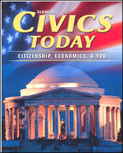
Civics Today Citizenship, Economics, & YouChapter 10: Voting and ElectionsSelf-Check Quizzes |  |
 | ||||||||||||||||||||||||||||||||||||||||||
| ||||||||||||||||||||||||||||||||||||||||||



Textbook Resources
Unit Resources
Chapter Activities
Section Resources



Teacher
Student
Textbook Resources
Unit Resources
Chapter Activities
Teacher
Student
Section Resources

  | |||||||||||||||||||||||||||||||||||||||||||||||||
Please read our Terms of Use and Privacy Notice before you explore our Web site. To report a technical problem with this Web site, please contact the Web Producer. | |||||||||||||||||||||||||||||||||||||||||||||||||


